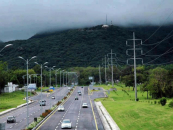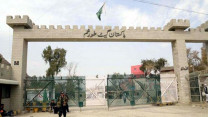Global player: Pakistan’s potential highlighted
Participants of NUST seminar say efficient governance need of the hour.

Daniel F Runde. PHOTO: csis.org
This was said by Daniel F Runde of the Centre for Strategic and International Studies (CSIS) at a seminar organised by National University of Science and Technology (Nust) on Monday. The event was organised by the university’s global think tank network (GTTN) in collaboration with the CSIS, said a press release.
“Pakistan has all necessary ingredients to be the next Colombia or Indonesia,” said the development expert.
Senior fellow at GTTN, Humayun Gauhar, moderated the session titled “The US-led International Developments and Effects on Pakistan and the Region.”

Runde pointed out that Pakistan is a significant South Asian country with massive urbanisation trends and 60 per cent population under 30 years of age, which is a healthy indicator of demographic productivity. The Pakistani diaspora in the US must also be mobilised in order to optimise their presence in the US and strengthen Pakistan’s image as an emerging country, he added.
NUST adviser and GTTN President Amer Hasmi said sustainable economic development was crucial for Pakistan’s rise. He emphasised the need of innovation-based higher learning in Pakistan and explained the university’s contribution through its knowledge ecosystem. He highlighted GTTN’s goals and efforts in furnishing viable policy options for issues of national, regional and global importance.
He apprised the audience that the Nust national science and technology park had won the official candidacy for hosting the 34th International Association of Science Parks’ 2017 World Conference on Innovation in Islamabad. He urged all friends of Pakistan to help the university win the event which has full potential to be a game-changer for the country’s development itinerary.
The CSIS delegation considered China-Pakistan Economic Corridor as a watershed opportunity and a turning point for Pakistan, adding that the American investors are also interested to tap into the Pakistani market.
Some of the Pakistani participants, however, took this optimism with a pinch of salt. There was a view that the issues of accountability, performance and governance should be resolved, if Pakistan was to progress in substantive terms.
The event marked a productive discourse on fall-out of current geopolitics, its implications for Pakistan and the region at large, and a pragmatic approach to manage challenges.
The participants achieved a general consensus of resolving Pakistan’s critical indigenous issues through self-reliance and efficient governance, performance and accountability.
Several former diplomats and bureaucrats, along with academics, researchers and students attended the event.
Published in The Express Tribune, August 4th, 2015.



















COMMENTS
Comments are moderated and generally will be posted if they are on-topic and not abusive.
For more information, please see our Comments FAQ